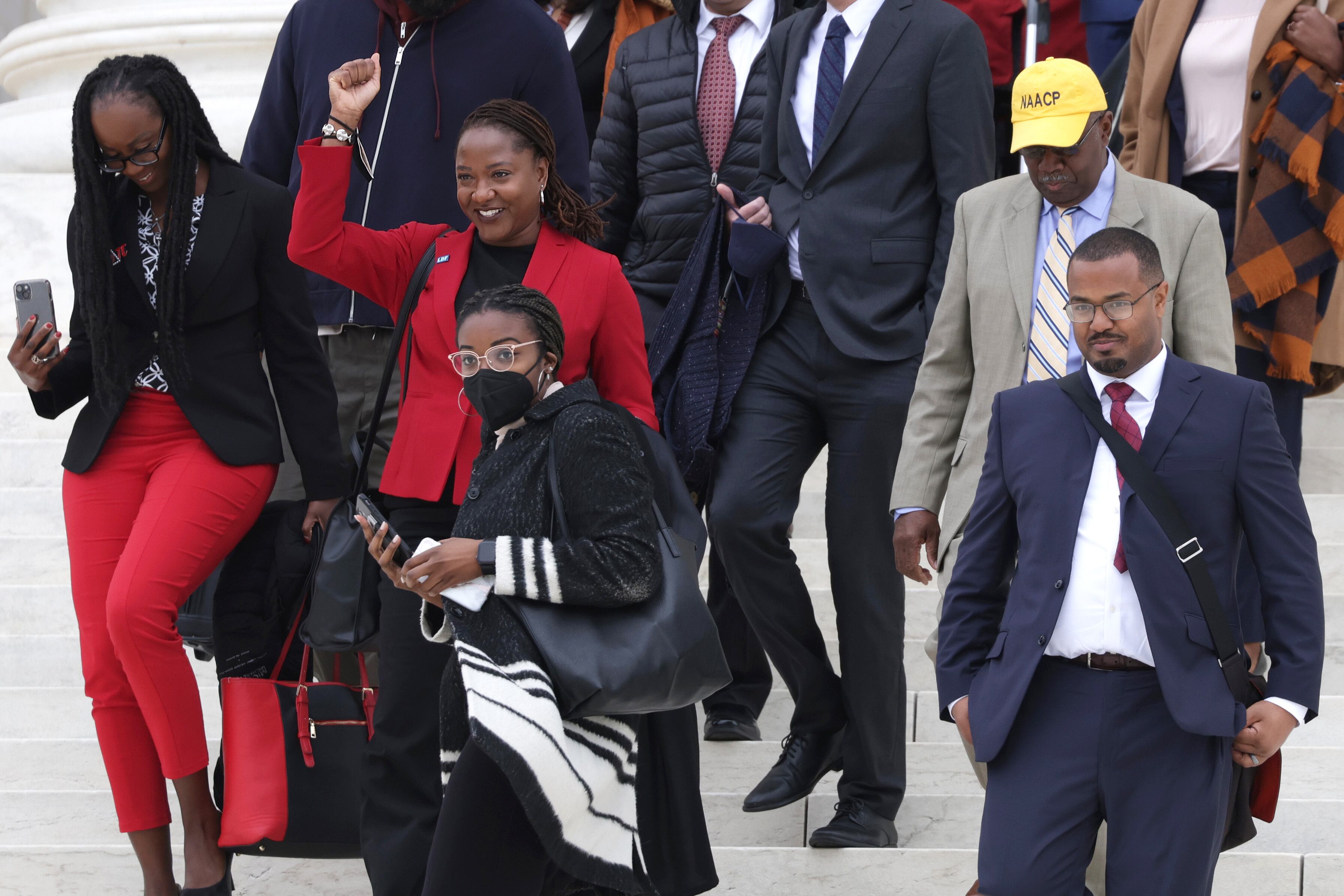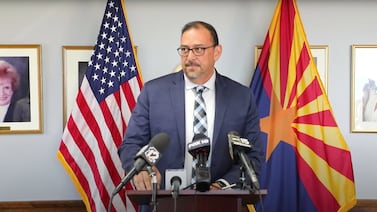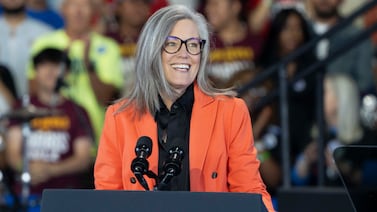Votebeat is a nonprofit news organization reporting on voting access and election administration across the U.S.
A version of this post was originally distributed in Votebeat’s free weekly newsletter. Sign up to get it delivered to your inbox every Saturday.
Given how the Supreme Court’s decisions have slowly eroded the power of the landmark Voting Rights Act in the decade since Shelby v. Holder, columnists and legal experts have spilled a lot of ink trying to figure out how far a majority of conservative justices might be willing to go.
Now, we know.
The majority decision in Allen v. Milligan this week was, well, surprising. Chief Justice John Roberts and Justice Brett Kavanaugh joined the court’s three liberals in a decision that essentially no one saw coming: The status quo of the Voting Rights Act — such as it is — has been maintained. For now.
Nicholas Stephanopoulos, a Harvard Law School professor who submitted an amicus brief in the case, called it “an absolutely stunning development.”
And it was! I’d been preparing for voting coverage of a decision that potentially went a very different way.
Instead, the decision amounts to a pretty complete spanking of the state of Alabama’s legal argument. I am not the first person to point out that it must sting all the more because of who wrote it: Roberts, a man whose legal career has been more or less propelled by his disagreement with basically all of the Voting Rights Act.
That said, he appears to be a jurist who cares deeply about a competently constructed legal argument, and his opinion makes it pretty clear that Alabama didn’t have one.
In no uncertain terms, Roberts flatly refuses to upend four decades of precedent on Section 2 of the voting rights statute, which prohibits voting practices that deny or curtail the right to vote based on race. Roberts, writing on behalf of the majority, not only shreds Alabama’s argument, but seems actually offended by it.
Plaintiffs represented by the NAACP Legal Defense Fund, among others, argued Alabama’s new congressional maps diluted Black voting power, and the state should be required to create a second congressional district with a majority of Black voters.
In response, Alabama challenged Section 2 of the VRA on the grounds that it forced state legislatures to prioritize race over traditional redistricting techniques (such as compactness). In effect, argues Alabama, Section 2 attempts to achieve racial proportionality, which is unconstitutional. The state advocates that Section 2’s race-based criteria for redistricting instead be supplanted by a “race-neutral benchmark.”
Roberts rejects all of this. Section 2, after all, has been around for four decades, and almost nowhere in the country has achieved racial proportionality in its representation, as Stephanopoulos and others proved in their brief. The benchmark the state offered, Roberts writes, is neither sufficient nor researched well enough to justify throwing nearly 40 years of precedent overboard.
He calls the test proposed by the state “flawed on its fundamentals.” He writes that Alabama was functionally asking the court to “graft” completely new requirements onto Section 2. He even told Alabama it couldn’t do math! (“Alabama misconceives the math project that it expects courts to oversee.” Yeesh!) The majority opinion is sprinkled with “The Court disagrees with Alabama’s assertions” and “the Court similarly rejects Alabama’s argument.”
It’s a shockingly straightforward opinion, as Guy-Uriel Charles writes for Election Law Blog: “It has been such a long time since I’ve expected a majority of the Court to fairly apply its prior voting rights precedents, to interpret the VRA without malice, and to read the record fairly that I have forgotten what that looks like.”
And yet, Charles writes, “It would be naive to get used to it.”
The Milligan decision represents rare good news out of the Supreme Court for voting rights advocates, but it may not last. Roberts’ opinion, together with Kavanaugh’s concurrence and dissents from the four other conservative justices, signal this Supreme Court could still rethink Section 2. Roberts and Kavanaugh, though, weren’t going to do it on the basis of this argument from Alabama.
“The heart of these cases is not about the law as it exists,” the chief justice wrote in his 34-page opinion. “It is about Alabama’s attempt to remake our Section 2 jurisprudence anew.”
Roberts also made sure to note his opinion did not “diminish or disregard the concern” that the law “may impermissibly elevate race in the allocation of political power within the States.”
For his part, Justice Kavanaugh even plucked an argument out of Justice Clarence Thomas’s dissenting opinion, taking a stab at offering a better argument for rethinking Section 2 than Alabama was able to (some of the more obvious signposting I have seen in a recent voting rights case). While he advises that “the authority to conduct race-based redistricting” might not “extend indefinitely into the future,” “Alabama did not raise that temporal argument in this Court, and I therefore would not consider it at this time.”
But, for now, let’s set that foreshadowing aside and focus on what this means for the near future. A majority of the Supreme Court — including Kavanaugh — had previously allowed these maps to go into effect in 2022 while this case worked its way through the process. Other states, including Louisiana, were also allowed to go ahead with what advocates say are clearly unconstitutional maps under the Milligan decision. Alabama isn’t the only state that now is expected to reluctantly redraw its political boundary lines.
Hours after the decision dropped, Politico Playbook asked, “Did the Supreme Court just flip the House?” It’s answer: Maybe! Cook Political Report, under the same reasoning, changed its predictions on five House races across three states — Alabama, Louisiana, and North Carolina, shifting all toward Democrats.
Nathaniel Rakich of FiveThirtyEight explained earlier this year how this decision would reverberate. He’s worth reading again now.
“Alabama is not the only state where it is possible to draw an additional minority-opportunity district,” he writes. Louisiana, for example, had a case put on hold as this case worked its way through to the finish line. “But in light of how the court ruled in Alabama — a very similar case — this case is expected to be resolved in Democrats’ favor too. And there are other racial-gerrymandering lawsuits under consideration in Arkansas, Florida, Georgia, South Carolina and Texas as well.”
What’s clear from this decision is that a majority of Supreme Court justices may not like what Roberts described disapprovingly, in a 2006 voting rights decision, as “a sordid business, this divvying us up by race.”
But in this decision, in this case, Alabama proved there’s still a need for the protections of the Voting Rights Act.
Back Then
Let’s keep going with Allen v. Milligan! Legal scholar Derek Muller flagged an interesting parallel between Roberts’ opinion in Milligan and his opinion a decade ago striking down the preclearance formula for covered jurisdictions in Shelby County v. Holder.
“History did not end in 1965,” Roberts wrote in Shelby County, and ”But history did not stop in 1960,” he wrote in Milligan. When the chief justice of the Supreme Court makes a similar point in two different seismic voting rights decisions, pay attention.
New From Votebeat
From Votebeat Arizona: As northern Arizona county makes ballot hand-count plan, secretary of state steps in
From Votebeat Arizona: No rules for Maricopa as it replaces faulty ballot printers, spends $8 million
From Votebeat Texas: Texas is finally making voting easier for people with disabilities, including a new option to vote by mail
From Votebeat Pennsylvania: This Pa. county rejected voters’ flawed mail ballots. Then it refused to count their in-person votes, too.
In Other Voting News
- YouTube will now leave up content alleging fraud or errors occurred in the 2020 presidential election, a change in policy the company said is an attempt to avoid infringing on free speech, Axios reported.
- 2020 grants for election costs from former California Gov. Arnold Schwarzenegger, a Republican, did not constitute excessive in-kind contributions to the Biden presidential campaign because they were given based on subjective criteria on a nonpartisan basis to increase voter access, the Federal Election Commission said in dismissing a complaint, new documents show.
- The leaders of conservative nonprofit True the Vote used the group to improperly enrich themselves, a watchdog group alleged in a complaint to the IRS; and True the Vote’s former general counsel, Jim Bopp, is suing it for nonpayment, ProPublica reported.
- Contractors hired by Arizona’s state Senate to review the results of the 2020 election in Maricopa County were unable to tally the hand-recounted ballots, the Arizona Republic reported, citing newly available text messages and records, and the Cyber Ninjas unsuccessfully attempted to find a software product that could solve the problem.
- Election legislation under consideration in North Carolina mirrors the legislative agenda of a group led by former Trump lawyer Cleta Mitchell, leaked documents obtained by WRAL show. State Senate leader Phil Berger and Mitchell both said Mitchell did not write the bill.
Jessica Huseman is Votebeat’s editorial director and is based in Dallas. Contact Jessica at jhuseman@votebeat.org.






